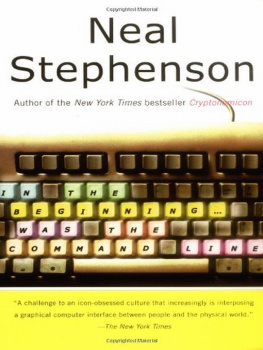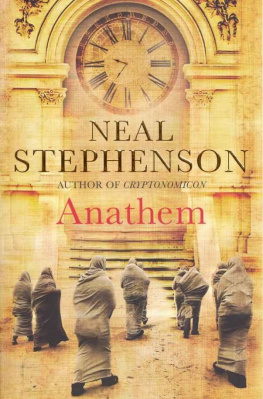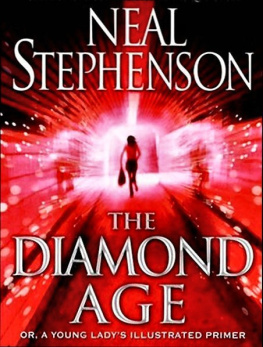Neal Stephenson - In the Beginning...Was the Command Line
Here you can read online Neal Stephenson - In the Beginning...Was the Command Line full text of the book (entire story) in english for free. Download pdf and epub, get meaning, cover and reviews about this ebook. year: 1999, publisher: HarperCollins, genre: Politics. Description of the work, (preface) as well as reviews are available. Best literature library LitArk.com created for fans of good reading and offers a wide selection of genres:
Romance novel
Science fiction
Adventure
Detective
Science
History
Home and family
Prose
Art
Politics
Computer
Non-fiction
Religion
Business
Children
Humor
Choose a favorite category and find really read worthwhile books. Enjoy immersion in the world of imagination, feel the emotions of the characters or learn something new for yourself, make an fascinating discovery.
- Book:In the Beginning...Was the Command Line
- Author:
- Publisher:HarperCollins
- Genre:
- Year:1999
- Rating:4 / 5
- Favourites:Add to favourites
- Your mark:
- 80
- 1
- 2
- 3
- 4
- 5
In the Beginning...Was the Command Line: summary, description and annotation
We offer to read an annotation, description, summary or preface (depends on what the author of the book "In the Beginning...Was the Command Line" wrote himself). If you haven't found the necessary information about the book — write in the comments, we will try to find it.
In the Beginning...Was the Command Line — read online for free the complete book (whole text) full work
Below is the text of the book, divided by pages. System saving the place of the last page read, allows you to conveniently read the book "In the Beginning...Was the Command Line" online for free, without having to search again every time where you left off. Put a bookmark, and you can go to the page where you finished reading at any time.
Font size:
Interval:
Bookmark:
NEAL TOWN STEPHENSON is the author of Snow Crash , The Diamond Age , Zodiac , and Cryptonomicon . Born on Halloween, 1959, in Fort Meade, Marylandhome of the National Security Agencyhe grew up in Champaign-Urbana, Illinois, and Ames, Iowa, before attending college in Boston. Since 1984 he has lived mostly in the Pacific Northwest and has made a living out of writing novels and the occasional magazine article.
Visit www.AuthorTracker.com for exclusive information on your favorite HarperCollins author.

Australia
HarperCollins Publishers (Australia) Pty. Ltd.
25 Ryde Road (PO Box 321)
Pymble, NSW 2073, Australia
http://www.harpercollinsebooks.com.au
Canada
HarperCollins Publishers Ltd.
55 Avenue Road, Suite 2900
Toronto, ON, M5R, 3L2, Canada
http://www.harpercollinsebooks.ca
New Zealand
HarperCollinsPublishers (New Zealand) Limited
P.O. Box 1
Auckland, New Zealand
http://www.harpercollinsebooks.co.nz
United Kingdom
HarperCollins Publishers Ltd.
77-85 Fulham Palace Road
London, W6 8JB, UK
http://www.harpercollinsebooks.co.uk
United States
HarperCollins Publishers Inc.
10 East 53rd Street
New York, NY 10022
http://www.harpercollinsebooks.com
Neal Stephenson
C RYPTONOMICON
T HE D IAMOND A GE
S NOW C RASH
Z ODIAC
Around the time that Jobs, Wozniak, Gates, and Allen were dreaming up these unlikely schemes, I was a teenager living in Ames, Iowa. One of my friends dads had an old MGB sports car rusting away in his garage. Sometimes he would actually manage to get it running, and then he would take us for a spin around the block, with a memorable look of wild youthful exhilaration on his face; to his worried passengers, he was a madman, stalling and backfiring around Ames, Iowa, and eating the dust of rusty Gremlins and Pintos, but in his own mind he was Dustin Hoffman tooling across the Bay Bridge with the wind in his hair.
In retrospect, this was telling me two things about peoples relationship to technology. One was that romance and image go a long way toward shaping their opinions. If you doubt it (and if you have a lot of spare time on your hands), just ask anyone who owns a Macintosh and who, on those grounds, imagines him- or herself to be a member of an oppressed minority group.
The other, somewhat subtler point, was that interface is very important. Sure, the MGB was a lousy car in almost every way that counted: balky, unreliable, underpowered. But it was fun to drive. It was responsive. Every pebble on the road was felt in the bones, every nuance in the pavement transmitted instantly to the drivers hands. He could listen to the engine and tell what was wrong with it. The steering responded immediately to commands from his hands. To us passengers it was a pointless exercise in going nowhereabout as interesting as peering over someones shoulder while he punches numbers into a spreadsheet. But to the driver it was an experience. For a short time he was extending his body and his senses into a larger realm, and doing things that he couldnt do unassisted.
The analogy between cars and operating systems is not half bad, and so let me run with it for a moment, as a way of giving an executive summary of our situation today.
Imagine a crossroads where four competing auto dealerships are situated. One of them (Microsoft) is much, much bigger than the others. It started out years ago selling three-speed bicycles (MS-DOS); these were not perfect, but they worked, and when they broke you could easily fix them.
There was a competing bicycle dealership next door (Apple) that one day began selling motorized vehiclesexpensive but attractively styled cars with their innards hermetically sealed, so that how they worked was something of a mystery.
The big dealership responded by rushing a moped upgrade kit (the original Windows) onto the market. This was a Rube Goldberg contraption that, when bolted onto a three-speed bicycle, enabled it to keep up, just barely, with Apple-cars. The users had to wear goggles and were always picking bugs out of their teeth while Apple owners sped along in hermetically sealed comfort, sneering out the windows. But the Micro-mopeds were cheap, and easy to fix compared with the Apple-cars, and their market share waxed.
Eventually the big dealership came out with a full-fledged car: a colossal station wagon (Windows 95). It had all the aesthetic appeal of a Soviet worker housing block, it leaked oil and blew gaskets, and it was an enormous success. A little later, they also came out with a hulking off-road vehicle intended for industrial users (Windows NT), which was no more beautiful than the station wagon and only a little more reliable.
Since then there has been a lot of noise and shouting, but little has changed. The smaller dealership continues to sell sleek Euro-styled sedans and to spend a lot of money on advertising campaigns. They have had GOING OUT OF BUSINESS ! signs taped up in their windows for so long that they have gotten all yellow and curly. The big one keeps making bigger and bigger station wagons and ORVs.
On the other side of the road are two competitors that have come along more recently.
One of them (Be, Inc.) is selling fully operational Batmobiles (the BeOS). They are more beautiful and stylish even than the Euro-sedans, better designed, more technologically advanced, and at least as reliable as anything else on the marketand yet cheaper than the others.
With one exception, that is: Linux, which is right next door, and which is not a business at all. Its a bunch of RVs, yurts, tepees, and geodesic domes set up in a field and organized by consensus. The people who live there are making tanks. These are not old-fashioned, cast-iron Soviet tanks; these are more like the M1 tanks of the U.S. Army, made of space-age materials and jammed with sophisticated technology from one end to the other. But they are better than army tanks. Theyve been modified in such a way that they never, ever break down, are light and maneuverable enough to use on ordinary streets, and use no more fuel than a subcompact car. These tanks are being cranked out, on the spot, at a terrific pace, and a vast number of them are lined up along the edge of the road with keys in the ignition. Anyone who wants can simply climb into one and drive it away for free.
Customers come to this crossroads in throngs, day and night. Ninety percent of them go straight to the biggest dealership and buy station wagons or off-road vehicles. They do not even look at the other dealerships.
Of the remaining ten percent, most go and buy a sleek Euro-sedan, pausing only to turn up their noses at the philistines going to buy the station wagons and ORVs. If they even notice the people on the opposite side of the road, selling the cheaper, technically superior vehicles, these customers deride them as cranks and half-wits.
The Batmobile outlet sells a few vehicles to the occasional car nut who wants a second vehicle to go with his station wagon, but seems to accept, at least for now, that its a fringe player.
The group giving away the free tanks only stays alive because it is staffed by volunteers, who are lined up at the edge of the street with bullhorns, trying to draw customers attention to this incredible situation. A typical conversation goes something like this:
HACKER WITH BULLHORN : Save your money! Accept one of our free tanks! It is invulnerable, and can drive across rocks and swamps at ninety miles an hour while getting a hundred miles to the gallon!
PROSPECTIVE STATION WAGON BUYER : I know what you say is truebuterI dont know how to maintain a tank!
Font size:
Interval:
Bookmark:
Similar books «In the Beginning...Was the Command Line»
Look at similar books to In the Beginning...Was the Command Line. We have selected literature similar in name and meaning in the hope of providing readers with more options to find new, interesting, not yet read works.
Discussion, reviews of the book In the Beginning...Was the Command Line and just readers' own opinions. Leave your comments, write what you think about the work, its meaning or the main characters. Specify what exactly you liked and what you didn't like, and why you think so.












